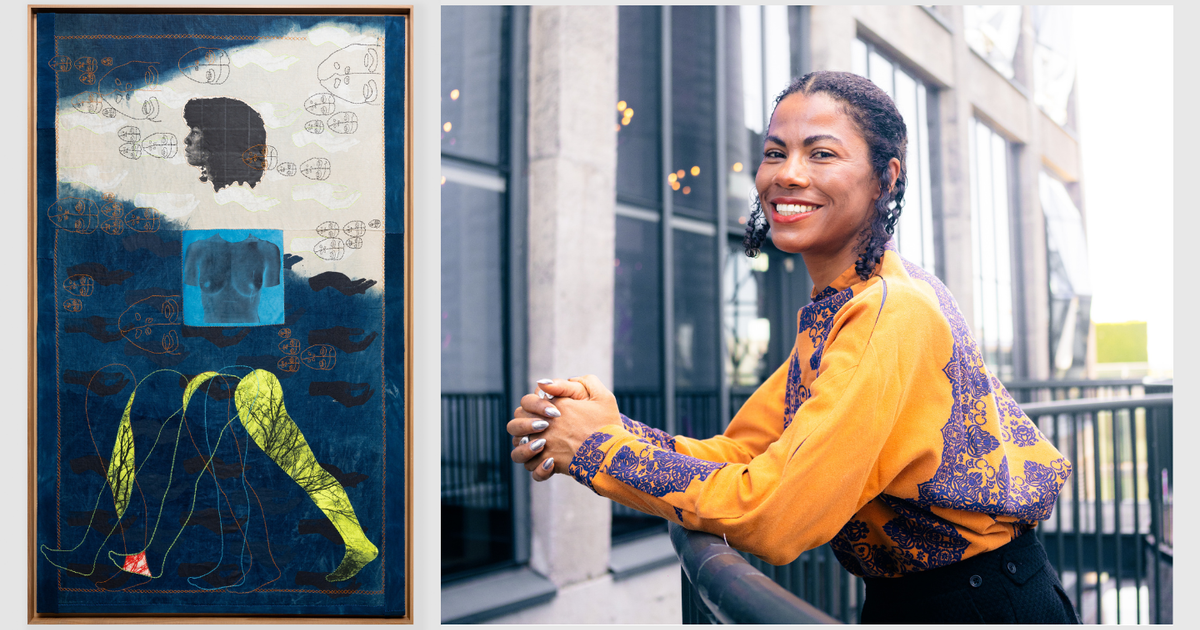Zeitz MOCAA presents We Proceed in the Footsteps of the Sunlight, the first museum survey exhibition of Ghanaian-German artist Zohra Opoku. The exhibition traces a decade of quiet revolutions in cloth, memory, and self within the artist’s practice. It draws together textured expressions of personal history and cultural inheritance and reveals an artistic journey that is constantly in motion.
Trained in fashion design and photography in Germany, Opoku extends her command of textiles into a layered visual language that moves fluently across photography, printmaking, and textile-based installation. For Opoku, fabric is a generative material through which questions of identity, memory, and ancestral lineage are thoughtfully explored. These themes unfold across the breadth of her practice, as she turns to printmaking, photography, and sculpture as complementary mediums for reflecting on selfhood and lived experience.
By attending to the intimate relationship between cloth and the body, her practice reveals how garments operate as conduits of memory—marking personal and collective histories alike. Textiles, given by family members or sourced from local markets, become double-edged: at once concealing and exposing, offering protection while inscribing recycled narratives of belonging, history, and materiality. Ultimately, Opoku proposes alternate modes of self-fashioning.
This tension between concealment and revelation underpins Opoku’s sustained inquiry into the interwoven and shifting contours of identity. Grounded in her Ghanaian-German heritage, she turns to family archives as both source and method—mapping intergenerational memory while positioning her work within broader conversations on womanhood and cultural inheritance.
In Opoku’s practice, cloth emerges as an active agent—shaping histories, signalling protection, and embodying cycles of transformation and continuity. This survey exhibition offers a reflective mapping of the artist’s trajectory over the past decade, articulated through several major bodies of work and anchored by three recurring elements: Water, indicating the liquidity of practice through the artist’s process, and sanctification of daily rituals as seen in After the prayer / before the prayer (2018). Breath, the ultimate life force which feeds the human spirit, lingering between the veil of life and death as explored in the series The Myths of Eternal Life (2020–2024). Ground, the stabilising force of nature, a place of comfort and rootedness, imbued with identity and familial belonging, as depicted in the series Queen Mothers (2016), Unraveled Threads (2017) and Give Me Back My Black Dolls (2024–ongoing).
The title We Proceed in the Footsteps of the Sunlight is drawn from the Book of the Dead, also known as Coming Forth by Day, an ancient Egyptian funerary text designed to guide the soul beyond the physical world. In Opoku’s hands, it becomes a quiet declaration; a tracing of the artist’s passage through turbulence, and a signal toward the path still unfolding ahead. The full extract reads: I proceed in the footsteps of the sunlight. I am one who knows the path of secrets (and) the Gate of the Field of Reeds. I exist therein. See me, I am come. I have overthrown my enemies upon the earth. My corpse, it is buried.
The curatorial intent of the exhibition speaks to emotional fortitude, mental tenderness, and spiritual depth. It positions Opoku at the centre of her universe—steady and alert—both protector of, and protected by, the sun that surrounds her: an omnipresent, life-giving force that has long illuminated her path. The exhibition unfolds as an homage to ancestral presence and future lineage—a recognition of her role as both guardian and the guarded, grounded in the knowledge that while this life is temporary, the soul endures.
We Proceed in the Footsteps of the Sunlight forms part of Zeitz MOCAA’s ongoing series of in-depth, research-driven solo exhibitions that centre and contextualise the practices of significant artists from Africa and its diaspora, as well as those engaging with pivotal themes in pan-African history. In the spirit of radical solidarity, this programme extends beyond the continent’s borders, attending to enduring and emerging entanglements that position Africa within a global context, and the world within Africa’s.
